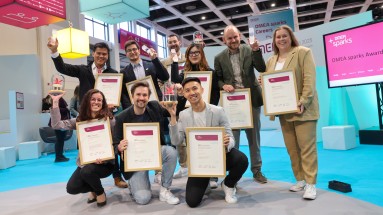Page content
DMEA sparks Award for innovative bachelor's and master's theses

The winners of the DMEA sparks Award 2025.
The Bern University of Applied Sciences (BFH) must be doing something right in the education of its students: once again, four BFH students have been able to prevail against strong competition with their theses and bring the coveted DMEA sparks Award back to Switzerland.
Digital planning in the operating room
In the Bachelor's thesis category, first place this year goes to Pascal Leuthold and Michael Nguyen from the Bern University of Applied Sciences. They chose the “Digitization of the Huddle Board in the Sonnenhof Operating Room” as the topic of their bachelor's thesis. Huddle boards are visual aids that support healthcare teams in communicating, coordinating and monitoring patient care and departmental operations. Leuthold and Nguyen developed a digital prototype that contains all the important information and is connected to the personnel planning interface. During a two-week test phase, the digital huddle board was tried out by the employees, who subsequently gave positive feedback and continued to use it after the test phase.
Aftercare via app
Second place in the bachelor's thesis category goes to Luana Schmid and Michael Zuberbühler, also from the Bern University of Applied Sciences. They wrote their bachelor's thesis on the topic “soH Recovery mobile app - customized healing processes for orthopedic procedures”. Schmid and Zuberbühler developed a recovery app that combines all the relevant information for patients about an orthopedic procedure, thus improving aftercare. The information in the app is customized according to the patient's state of health and the severity of their pain. The app also provides exercises that can be done at home. The associated admin tool can be used by medical professionals to customize the care provided to each patient. Schmid and Zuberbühler were able to find a developer for their app so that it can be used in everyday practice.
Evaluating images securely
The third-place finish in the bachelor's thesis category went to Peiyao Mao of the University of Bamberg. She wrote her thesis on the topic “Exploring and Evaluating Deep Hashing Methods within Vision Foundation Model Feature Spaces for Similarity Search and Privacy Preservation”. In the digital age, meaningful images are becoming more and more important – for example in social media or medical diagnostics. In her bachelor's thesis, Mao examined how modern vision transformer (ViT) models and special hashing methods can help to search through image data efficiently while protecting privacy. This involves converting image information into compact, hashed forms that remain semantically meaningful but conceal personal data.
More exercise with MS
Carina Arnberger from the Technical University of Vienna won the DMEA sparks Award in the “Master's Theses” category with her thesis on “Analysis, design and prototyping of a gamified app to motivate people with physical limitations due to multiple sclerosis to increase their physical activity” . As the title suggests, Arnberger developed an app designed to help MS patients get moving and to enable therapists to provide individual support for treatment. The users surveyed gave positive feedback on the prototype. Carina Arnberger suggests adapting the format of the app to other medical conditions.
Can AI predict diseases?
Second place in the “Master's Theses” category went to Minh Duc Do from Freie Universität Berlin. He wrote his thesis on the topic “Multi-modal Brain MRI Vision Transformers for the prediction of disease onset”. In his work, he trained an artificial intelligence with MRI images to not only detect changes, but also, in the next step, to predict diseases. Using MRI images of the brain, it has been possible to predict Alzheimer's, dementia or even type 1 diabetes with a very high degree of probability.
Using AI to detect brain tumors and create prognoses.
Third place goes to Juan Carlos Climent Pardo from the Technical University of Munich and Harvard Medical School. He also used AI in his master's thesis, entitled: “Diagnosis and growth prognosis of pediatric low-grade gliomas using artificial intelligence (AI) and magnetic resonance imaging (MRI).” In this work, Climent Pardo identified brain tumors in children and examined their growth prognosis with the help of artificial intelligence and MRI scans.
Machine Learning vs. Large Language Models
In the “Audience Award” category, it is not the expert jury that decides on the ranking of the applicants, but the audience. Based on the vote among YouTube videos, this year's Audience Award goes to Marco Florian Aigner from the University of Heidelberg and the Heilbronn University of Applied Sciences. He wrote his master's thesis on “Automated Title/Abstract-Screening of Scientific Articles: An Evaluation and Comparison of Supervised Machine Learning and Large Language Models”. His work deals with systematic reviews. To create these, many individual papers have to be selected and read. This could be supported by machine learning or large language models. Aigner examined four variants. His conclusion: large language models are more accessible, reliable and trustworthy than supervised machine learning.


